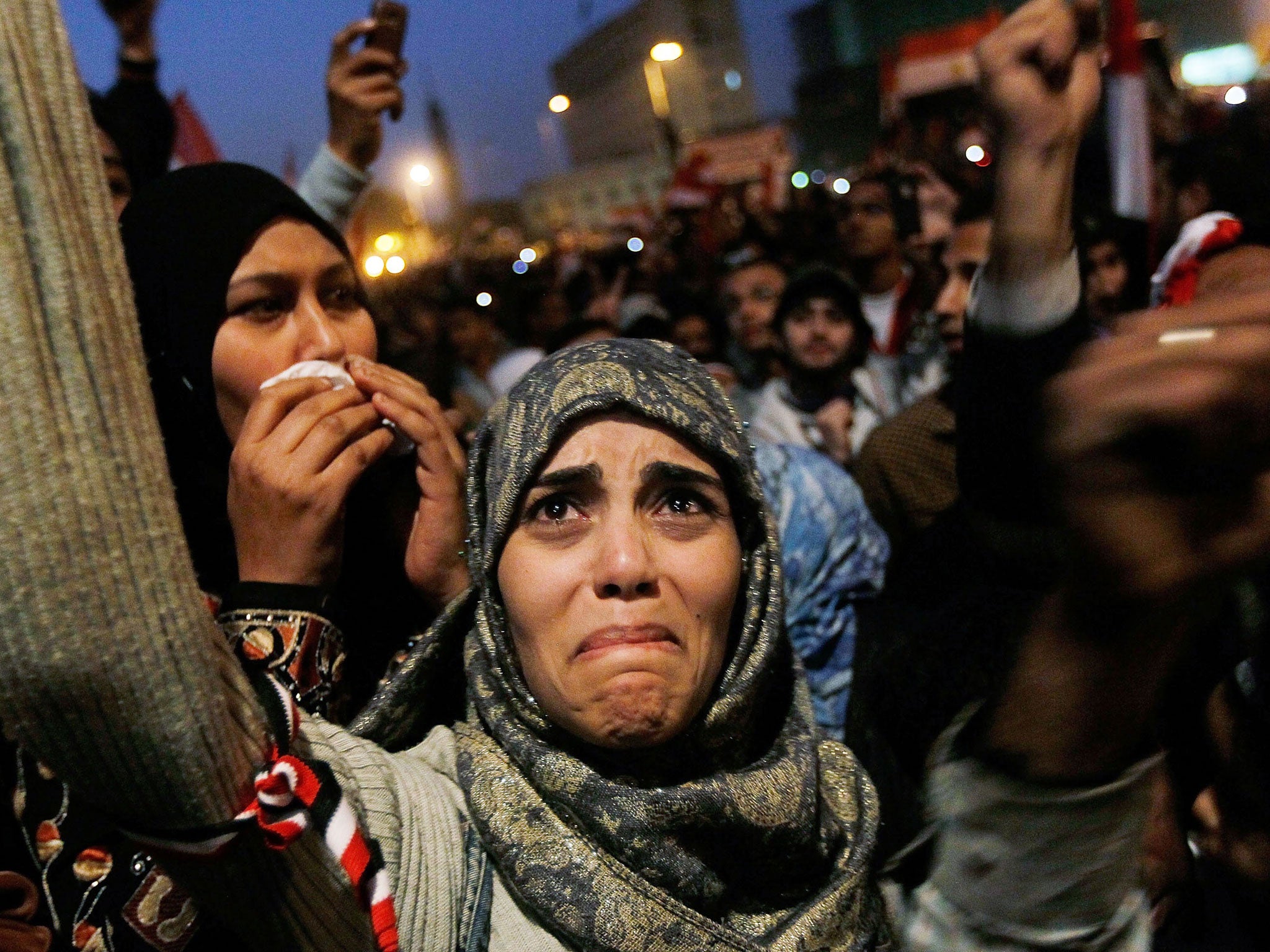Revealed: Egypt is the worst Arab country for women
Sexual violence and reduced representation mean the Arab Spring has only made problem worse

The fallout from the political upheaval in Egypt has made it the worst country in the Arab world to be a woman in, according to research published exclusively today in The Independent.
Increasingly commonplace sexual violence has combined with plummeting female representation in parliament and a growth in more extreme Islamic views to push the country to the bottom of the region for women’s rights. Egypt was ranked 22nd – below Iraq and Saudi Arabia – in polling on 22 Arab states’ treatment of women by the Thomson Reuters Foundation.
The island nation of Comoros, where women hold 20 per cent of ministerial positions and wives generally keep land or the home after divorce, came out on top. It was followed by Oman, Kuwait, Jordan and Qatar. More than 300 gender experts in the 21 Arab League states and Syria rated the countries according to different issues affecting women, including politics, reproductive rights and gender violence. Iraq was ranked second-worst after Egypt, followed by Saudi Arabia, Syria and Yemen.
In politics, Egypt’s uprisings have brought disappointment for women, with female representation in parliament falling from 12 per cent to just 2 per cent following the abolition of quotas. It was hoped that the Arab Spring would present fresh opportunities for women, but instead the situation has got worse for many, as revolts have brought conflict and instability.
The Egyptian columnist and feminist Mona Eltahawy believes the legacy of Hosni Mubarak, the country’s ousted dictator, is living on in the country’s abysmal record on women. She said: “We removed the Mubarak from our presidential palace but we still have to remove the Mubarak who lives in our minds and in our bedrooms.
“As the miserable poll results show, we women need a double revolution: one against the various dictators who’ve ruined our countries and the other against a toxic mix of culture and religion that ruins our lives as women.”
Genital cutting is also commonplace in Egypt, with some 27.2 million women falling victim to it, the largest number in a single country in the world, according to Unicef figures.
Anecdotally it appears that cases of sexual assault and harassment are becoming more common in Egypt, though there are scant statistics from previous decades to use as a comparison. More than 99 per cent of women and girls have experienced some form of sexual harassment, according to United Nations research published earlier this year.
It is through individual stories that you get an idea of how quickly things have changed. When a girl was sexually harassed in downtown Cairo in daylight in the 1990s, academics say her case was then notorious enough to provoke outrage and she became known to as the “el Ataba girl”. Now reports of incidents seem to come along in their hundreds, particularly during religious festivals and political protests.
At last year’s Eid celebrations, for example, there were records of more than 700 cases of sexual harassment across the country. In the four days of mass protests which resulted in the ousting of President Mohamed Morsi on 3 July, more than 90 women reported being sexually assaulted in Tahrir Square alone.
The country’s centre for women’s rights has called the soaring number of rape and harassment cases a “social cancer”. Describing the severity of incidents, Diana Eltahawy, an Amnesty International researcher in North Africa, said: “We’re talking about women being surrounded by crowds of men in public and having their clothes ripped off and being touched and penetrated. In some case people were raped too.”
Jane Kinninmont, senior research fellow on the Middle East and North Africa at Chatham House, was surprised that Egypt came out worse than Saudi Arabia for women, but believes changing representation in politics has a crucial role to play.
She said: “Saudi Arabia probably has the most discriminatory laws for women but one thing that has become worse in Egypt than Saudi is the number of women in parliament. Under the Mubarak regime there used to be a quota for women but they got rid of it when they had elections. Thanks to a top-down decision from the King, Saudi is doing much better with about 20 per cent of seats represented by women.”
Ms Kinninmont said that dramatic improvements for Kuwaiti women over the last 10 years were likely to be behind the country’s position as the third-best in the region. “Previously it might have come out fairly similarly to Saudi Arabia, but within the last decade women have got the right to vote and the right to travel and get their own passports without needing permission from a male relative.”
Egypt’s ranking will be a further blow for the country’s international reputation ahead of its appearance on Thursday before the UN Committee on Economic, Social and Cultural Rights in Geneva. It will be the first time Egypt has appeared before a UN human rights body since the revolution in 2011.
Amongst the issues the country’s representatives will be questioned on is how the revolution has failed to improve lives for women and how, in many cases, it has made it worse.
Subscribe to Independent Premium to bookmark this article
Want to bookmark your favourite articles and stories to read or reference later? Start your Independent Premium subscription today.

Join our commenting forum
Join thought-provoking conversations, follow other Independent readers and see their replies